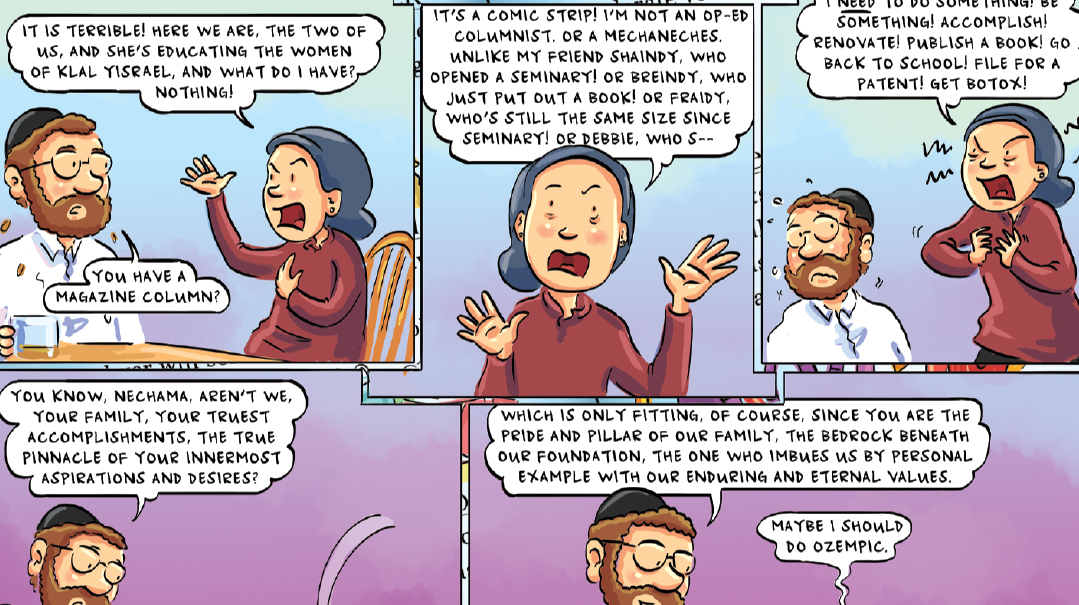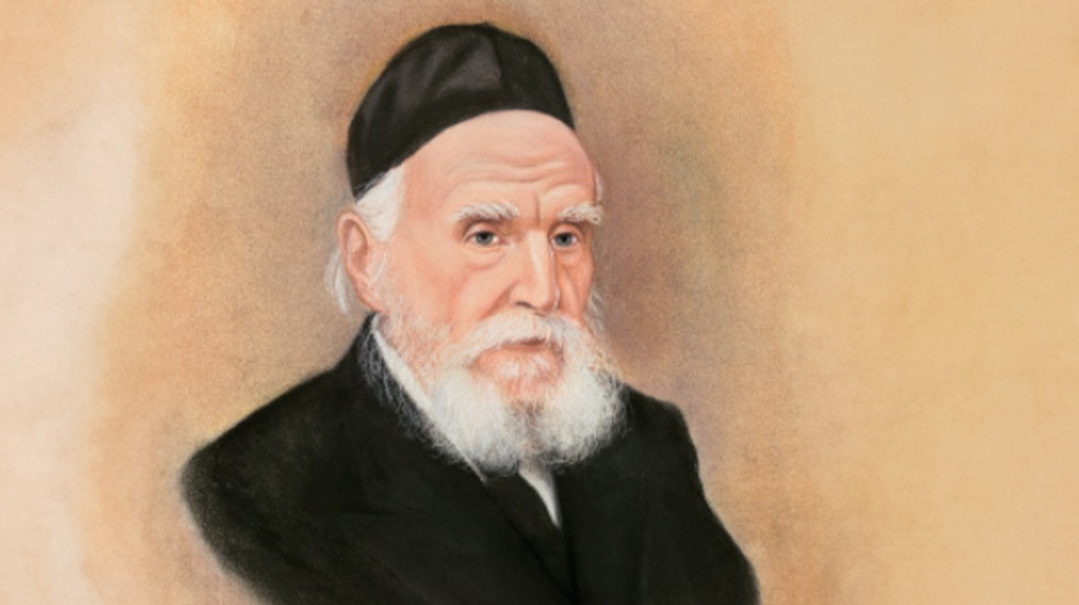Divine Right

Why must the Jews be forced to defend themselves for living in Eretz Yisrael?
B
efore-and-after pictures are meant to be studies in contrast — and indeed, one cannot imagine a greater contrast than that of the images we saw of Israel before the Gaza invasion with those we have seen since. The “before” images were of a country torn asunder, of a nation at the brink of civil war. But the “after” images have been of heartwarming unity, of chareidim hugging chilonim, of secular soldiers singing Torah-based songs, and of unified prayers for the safety the hostages, and for all of Klal Yisrael.
But the lesson here is not just about unity. I think it’s really about something much deeper.
Rav Eliyahu Boruch Shulman makes a fascinating point on the very first Rashi of the Torah. Rashi cites a Midrash that asks why the Creation account was needed. Why not begin immediately with the laws in parshas Bo? The Midrash answers that the Torah begins with Creation to provide an answer to the nations of the world who claim, “Listim atem,” the Jews are bandits for stealing the land from the Seven Nations. In response, we can point to the Torah and say that Hashem created the world and He gives to whom He wishes.
At first glance, the objection of the nations is nonsensical. The Canaanites were not the first possessors of Eretz Yisrael. Rashi (in Lech Lecha) writes that they conquered it from the descendants of Shem. So how can they object to our conquering it from them? And anyway, isn’t it the way of the world for stronger nations to conquer the lands of weaker ones? It’s difficult to find too many nations that have lived in their land from time immemorial. Why must the Jews be forced to defend themselves for living in Eretz Yisrael?
The simple answer is that there is double standard when it comes to Jews. The renowned social philosopher Eric Hoffer wrote in 1968:
The Jews are a peculiar people: things permitted to other nations are forbidden to the Jews. Other nations drive out thousands, even millions of people, and there is no refugee problem. Russia did it, Poland and Czechoslovakia did it. Turkey threw out a million Greeks, and Algeria a million Frenchman. Indonesia threw out heaven knows how many Chinese — and no one says a word about refugees. But in the case of Israel, the displaced Arabs have become eternal refugees...Other nations when victorious on the battlefield dictate peace terms. But when Israel is victorious, it must sue for peace… Everyone expects the Jews to be the only real Christians in this world.
But that cannot be Rashi’s intention; if so, the Torah could have skipped from Creation to parshas Bo. There would be no need to include the accounts of the Avos’ lives and the events of Klal Yisrael in Mitzrayim.
The real answer, suggests Rabbi Shulman, is that there is a fundamental difference between the way we claim that Eretz Yisrael belongs to us, and the way other nations claim their ancestral lands. The Celts owned England only until the Saxons conquered them; and the Saxons until the Normans came. Under this system of conquest and acquisition, no one would suggest that today’s Britons should give their country back to the Celts. Nor does anyone seriously think that the United States should give its land back to the Native Americans.
But our claim to Eretz Yisrael operates on a different plane. We claim that Eretz Yisrael is ours intrinsically, Divinely. Hashem created the world for Am Yisrael (Bereishis — Bishvil Yisrael shenikra Reishis), and specifically Eretz Yisrael as the Divinely intended home for Am Yisrael. To support that claim, we need everything the Torah writes from Creation until parshas Bo.
You see, Klal Yisrael’s origin story begins in this week’s parshah, parshas Lech Lecha. With hardly any preamble, Hashem appears to Avraham Avinu, instructing him to set out on a new life and head to Eretz Yisrael. Avraham is told that he will become a powerful and influential nation, and that those who bless him will be blessed, and those who curse him will be cursed. “V’nivrechu becha kol mishpechos ha’adamah — through you all the families of the earth will be blessed.”
Hashem is in effect giving him — and really, us — a mission statement. Avraham and his descendants have a message to bring to the world. If the nations accept and appreciate that message, they will be blessed; otherwise, they will not. The objective of the entire world’s existence is filled through its acceptance of Avraham’s message. “V’nivrechu becha kol mishpechos ha’adamah.”
Klal Yisrael was primed to receive that message through the experiences of the Avos and Shibud Mitzrayim, and they ultimately received that message at Har Sinai. However, even after accepting the Torah, they could have backed out and rejected that mission, since they had taken it on by force (“kafah aleihem har k’gigis,” Shabbos 88a). However, as Ramban (ad loc.) notes, had they done so, they would not have merited Eretz Yisrael. Why?
Because while Eretz Yisrael was created for Am Yisrael, the precise identity of “Am Yisrael” was not fixed. The title of “Chosen Nation” could have been assigned to whoever wished to be the bearer of Hashem’s message. Klal Yisrael could have backed out and someone else would have become Am Yisrael. In fact, after the Eigel, Hashem told Moshe Rabbeinu that a new Am Yisrael would be built from him, but Moshe refused. (Only after the events of Purim did Klal Yisrael resolve never to retract their commitment.)
In other words, to present our claim of a Divine and intrinsic right to Eretz Yisrael, we assert that Hashem created the world, and that we merited to be the nation to whom Hashem granted Eretz Yisrael, because He chose us to bear His message. Why did He do so? Because of our Avos, our experiences in the cauldron of Egypt, and ultimately, our acceptance of the Torah.
The recent civil unrest in Israel split the country along the fault lines of those who identify the state as just another democratic country — without any connection to Jewishness — and those who at least see it as a Jewish state. This is not a new controversy; in fact, a fascinating example of this divide can be seen in Harry Truman’s note recognizing the State of Israel a mere 11 minutes after it was declared. Note that the words “Jewish state” are crossed out and are replaced with “State of Israel.” At its very inception, the identity of the state was called into question.
Torah Jews certainly maintain that Klal Yisrael’s right to Eretz Yisrael is divine (whether they accept or reject the state). And one senses (or hopes) that even those of the right whose religiosity leaves much to be desired have an intuitive feeling of that divine right.
As reflected in the flood of images we have seen since the Hamas invasion, it is evident that even the left, even the nonreligious, are now identifying more strongly as Jews. There has been a mass revival of the feeling, of the intuition, that we are a people of destiny — that we in fact have the right to Eretz Yisrael because we are Hashem’s Am Yisrael.
The stronger our sense that we are the bearers of Hashem’s message to the world — the role that we accepted at Har Sinai — the stronger our claim to Eretz Yisrael becomes, and certainly the greater siyata d’Shmaya we will have in this conflict.
Shomer Yisrael, shemor sh’eiris Yisrael, v’al yovad Yisrael, ha’omrim “Shema Yisrael.”
(Originally featured in Mishpacha, Issue 983)
Oops! We could not locate your form.







